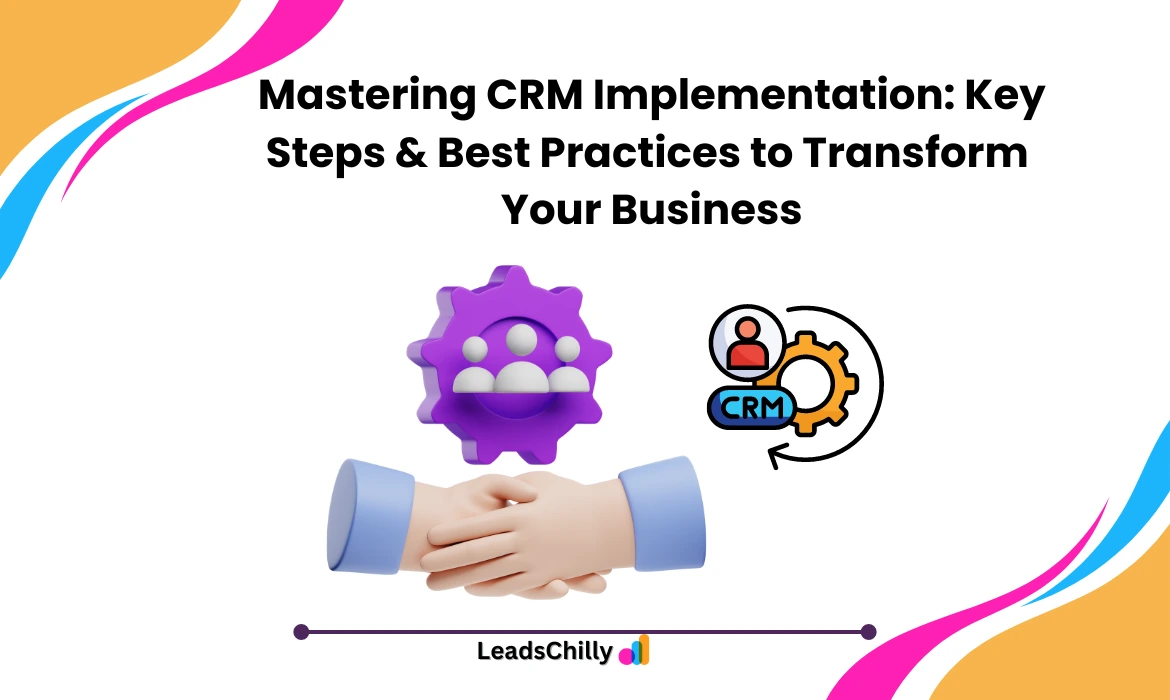Enterprises need a new way to connect with their customers in this digital age. That’s where Customer Relationship Management (CRM) technology comes into play. CRM Implementation helps businesses manage, modify, and gain detailed insights into their operations, making it a crucial tool for success.
Over the years, CRM has evolved to meet changing needs and has now become an essential part of most organizations. By 2028, CRM technology is projected to reach a value of $128.97 billion, with a compound annual growth rate (CAGR) of 12.1% over the next seven years.
The benefits of CRM include a centralized communication channel, increased customer retention, detailed insights and analytics, improved customer support systems, and much more.
What is CRM Implementation and Why Does It Matter?
CRM implementation refers to the process of installing, configuring, and deploying a Customer Relationship Management (CRM) system in your business. This process is crucial because a properly implemented CRM can lead to improved customer interactions, streamlined business processes, and ultimately, higher revenue. However, improper implementation can result in wasted resources and missed opportunities.
Key Benefits of Successful CRM Implementation
- Improved Customer Relationships: A well-implemented CRM allows businesses to manage customer interactions effectively, leading to better relationships and increased customer loyalty.
- Enhanced Efficiency: Automating tasks and centralizing information reduces the time and effort required to manage customer data, freeing up resources for more critical activities.
- Informed Decision-Making: With all customer data in one place, businesses can make data-driven decisions that drive growth and improve customer satisfaction.
How to Approach CRM Implementation
Implementing a CRM system is a strategic process that requires careful planning and execution. The key to successful CRM implementation is understanding your business needs, setting clear objectives, and choosing the right system that fits your goals.
Contact Management:
Contact management is a crucial component of CRM implementation. It involves organizing and storing customer information, such as contact details, communication history, and transaction records. Proper contact management ensures that your team has quick access to relevant customer data, enabling personalized interactions and better customer service.
- Why is contact management important in CRM implementation?
Contact management is the backbone of any CRM system, as it centralizes all customer data in one accessible place. This organization is essential for effective customer relationship management and ensures that no important detail is overlooked. - Best practices for contact management during CRM implementation.
Start by cleaning your existing data to remove duplicates and outdated information. Then, ensure that your CRM system is set up to capture all necessary customer details accurately. Regularly update and audit the data to maintain its accuracy.
On-Premise vs. Cloud-Based Solutions: Which is Better for CRM Implementation?
When implementing a CRM system, one of the first decisions you’ll need to make is whether to go with an on-premise solution or a cloud-based solution. Each option has its advantages and disadvantages, depending on your business needs.
- What are the pros and cons of on-premise CRM solutions?
On-premise CRM solutions offer more control and customization since the software is hosted on your company’s servers. However, they require a significant upfront investment in hardware and ongoing maintenance. This option is often preferred by larger companies with specific security and compliance requirements. - Why might a cloud-based CRM solution be the better choice?
Cloud-based CRM solutions are hosted on the provider’s servers and accessed through the internet. They offer greater flexibility, lower upfront costs, and automatic updates. This option is ideal for businesses that need to scale quickly or want to avoid the hassle of maintaining IT infrastructure.
Integration with Existing Systems:
For a CRM system to be truly effective, it needs to integrate seamlessly with your existing business systems, such as ERP, email marketing tools, and customer support software. Proper integration ensures that data flows smoothly between different platforms, providing a unified view of customer information.
- Why is integration crucial in CRM implementation?
Integration is critical because it prevents data silos, ensuring that all departments have access to the same up-to-date information. This leads to better collaboration, more informed decision-making, and a smoother customer experience. - How to successfully integrate CRM with your current systems.
Start by mapping out all the systems your CRM needs to integrate with. Then, choose a CRM solution that offers robust integration capabilities. Work closely with your IT team and CRM provider to ensure a smooth integration process.
Data Migration:
Data migration involves transferring existing customer data from your current systems into the new CRM platform. This step is crucial because any errors during data migration can lead to significant issues down the line, such as incomplete records or lost information.
- What are the challenges of data migration during CRM implementation?
Data migration can be challenging due to differences in data formats, the sheer volume of data, and the risk of data corruption. It’s essential to plan thoroughly and test extensively to ensure that all data is accurately transferred. - Best practices for a smooth data migration process.
Begin by auditing your existing data to identify and resolve any issues. Use automated tools to assist with the migration, and perform several rounds of testing to ensure accuracy. It’s also a good idea to back up all data before starting the migration.
User Training:
No CRM implementation is complete without proper user training. Even the most sophisticated CRM system will fail if your team doesn’t know how to use it effectively. Training ensures that all users are comfortable with the new system and can utilize its features to their fullest potential.
- Why is user training critical in CRM implementation?
Training is essential because it empowers your team to use the CRM system efficiently, leading to better adoption rates and faster ROI. Without training, employees may resist the new system, resulting in wasted resources and poor performance. - Effective strategies for CRM user training.
Offer a combination of formal training sessions, online tutorials, and hands-on practice. Tailor the training to different roles within the organization, and provide ongoing support to address any issues that arise after implementation.
Measuring Success:
Once your CRM system is up and running, it’s crucial to measure its success to ensure you’re getting a good return on your investment (ROI). Tracking key performance indicators (KPIs) will help you understand how well the CRM system is performing and where improvements might be needed.
- What KPIs should you track after CRM implementation?
Important KPIs include customer satisfaction scores, sales cycle length, lead conversion rates, and overall revenue growth. These metrics will help you gauge the effectiveness of the CRM system and its impact on your business. - How to continuously improve your CRM implementation strategy.
Regularly review your KPIs and gather feedback from users to identify areas for improvement. Stay informed about new CRM features and updates that could enhance your system’s performance, and be prepared to make adjustments as needed.
Quick Overview Table: Key Factors in CRM Implementation
|
CRM Implementation Factor |
Key Consideration |
Why It Matters |
|
Contact Management |
Centralized customer data storage |
Enhances personalized communication |
|
On-Premise vs. Cloud-Based |
Choice between control vs. flexibility |
Impacts scalability and cost |
|
Integration with Systems |
Seamless data flow across platforms |
Ensures consistent and accurate information |
|
Data Migration |
Accurate transfer of existing data |
Prevents data loss and ensures continuity |
|
User Training |
Ensuring team proficiency with CRM tools |
Maximizes CRM adoption and efficiency |
|
Measuring Success |
Tracking ROI and key performance indicators |
Validates the effectiveness of the CRM system |
Transform Your Business with Successful CRM Implementation
In conclusion, a well-planned and executed CRM implementation can be a game-changer for your business, driving customer retention, improving communication, and providing valuable insights that fuel growth.
However, the key to unlocking these benefits lies in a strategic approach that aligns with your business goals. Don’t leave your CRM success to chance—partner with LeadsChilly to ensure you get the most out of your CRM investment.
Ready to take the next step? Start your free 14-day trial with LeadsChilly today and see how we can help you transform your customer relationships and drive your business forward.
Frequently Asked Questions
The timeline can vary depending on the complexity of the CRM system and the size of the business, but it typically ranges from a few weeks to several months.
Yes, most CRM systems offer a high degree of customization to meet the unique requirements of different businesses.
Work with your CRM provider to implement strong security measures, including encryption, access controls, and regular security audits.
Many modern CRM solutions offer robust integration capabilities, allowing them to work seamlessly with existing legacy systems.
Costs can vary widely based on the CRM system, the size of the business, and the specific needs of the organization, but they generally include software licenses, implementation services, and training.




Comments are closed.